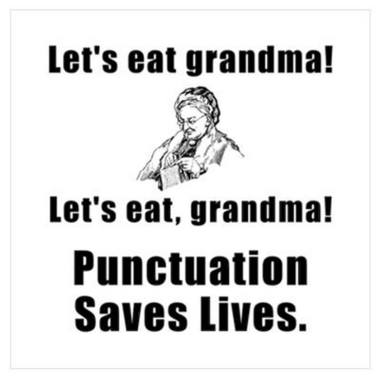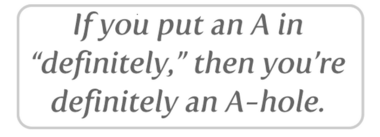Missing Punctuation Marks
You might be surprised at how vital proper punctuation can be.
Via This Charming Mum
The Wrong Version of “It’s”
Sorry, there’s absolutely no excuse for this one unless you’re a dyslexic third grader. It’s = The contraction of “it is”, with the apostrophe standing in for the I. Example: It’s horrible when people vandalize library books. Its = The possessive form of “it”. Example: The library book fell apart after its cover was pulled off.
“Taken for Granite”
Sorry, what? Someone mistook you for a block of stone? This is what happens when people watch TV instead of reading: they hear terms, but have no idea how they’re spelled. This is particularly common in areas where people may slur their words, or have strong accents. The correct term is “taken for granted”, but if it’s said quickly or drawled, it all clumps together. This also refers to place names like Cairo, Georgia, which is pronounced “KAY-ro”, and can thus end up being spelled several different ways.
Dropping the R at the End of “Your”
One of the most common typos I’ve come across is this one, caused by the fact that people type so quickly that they forget to add in the R at the end of “your” so it just ends up as “you”. Spellcheck won’t catch this one as it isn’t a spelling error per se, but it can alter the entire meaning of a sentence.
Definitely
This word is often spelled with an A in it, as “definately”. To cite the brilliant beasts over at The Oatmeal:
Misspelled Foreign Terms
Some folks seem to prefer to spell foreign terms phonetically instead of looking up the correct spellings. I used per se above, which is the Latin term for “of itself”, but I’ve seen it spelled as “pursay” instead. I’ve also come across “jenasayqua” instead of je ne sais quoi, and “tooshay” instead of touché. If you plan to interject foreign phrases into your writing, you have to ensure that you’ve spelled them correctly.
Voila/Viola
This goes along with the foreign terms mentioned above, but it deserves its own section solely for the sheer number of times it seems to pop up in people’s writing. It comes down to placement of the O and the I within the word, but can make all the difference in the world, depending on whether you’re showing something off, or mentioning the kind of stringed instrument that your kid plays.
Missing or Switched Letters
Although your spellcheck should, in theory, catch these slip-ups, they may still slip through on occasion. This can be incredibly embarrassing for businesses and organizations if the typos aren’t caught ahead of time, especially since so much can ride on promotional materials.
Via Hubspot
“Teh” instead of “The”
One of the more common misspellings, it occasionally crops up if people are trying to be cute in their writing: I got to pet all teh bunnehz! LOL. ^Like that. If you’re over the age of 12, just don’t.
Too Many Ns
Many people seem to feel the need to add an additional N to words like “shiny” or “dining”, so you end up with “shinny Christmas ball ornaments” or arguments at the “dinning table”. No-one wants shinny balls, trust me.
Except/Accept
Believe it or not, this little homophone tends to pop up rather often. The words sound similar, but they’re not interchangeable. To accept something means to take it, while the word “except” excludes the subject: I’m willing to accept an apology from anyone who gives one sincerely. Well, except for Aunt Griselda—she’s just evil.
“Alot”
You cannot begin to imagine how often this one pops up, even in professional writing. There is no such word as “alot“, so if you want to say that your receptionist talks a lot, or you bought a lot of biscuits on the weekend, be sure to keep that space in there.
Thank you, Hyperbole and a Half The best way to avoid these errors is to read your work aloud before submitting it, as the combination of visual and auditory processing seems to help most people catch the typos that were missed earlier. We all think more quickly than we can type, so it’s inevitable that there will be the occasional misstep as we try to harness brain-spew into coherent written pieces. Taking a few minutes to read a piece before shipping it off may seem like a waste of time, but it can actually save time for both you and your editor, since there will be fewer issues to resolve or revisions to make.



